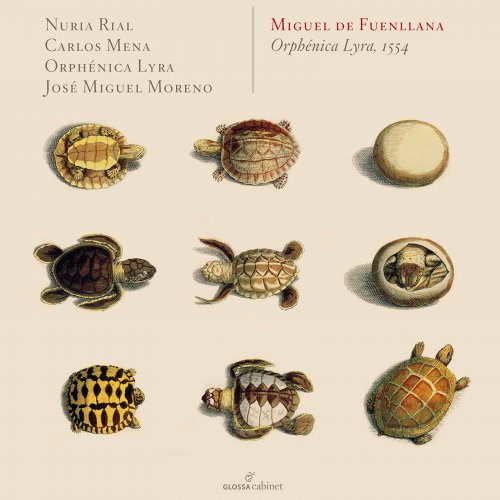
José Miguel Moreno, Orphenica Lyra - Orphénica Lyra (1554) (2020)
BAND/ARTIST: José Miguel Moreno, Orphenica Lyra
- Title: Orphénica Lyra (1554)
- Year Of Release: 2024
- Label: Glossa
- Genre: Classical
- Quality: flac lossless (tracks)
- Total Time: 01:00:58
- Total Size: 252 mb
- WebSite: Album Preview
Tracklist
01. La Bomba
02. Paseábase el rey moro
03. Buscad de oy mas
04. Morenica, dame un beso
05. Duo
06. Vos me matastes, niña en cabello
07. O felici occhi miei
08. No sé qué me bulle
09. Tant que vivray (Arr. M. Fuenllana for Voices & Chamber Ensemble)
10. Fantasia de redobles
11. La Girigonça
12. Madona mia
13. Cómo quereys, madre
14. Con qué la lavaré
15. O que bonica canción
16. Duelete de mi, señora
17. De los álamos vengo, madre
18. Benedictus, Missa de Mila regres
This is one of several albums of Spanish Renaissance secular music issued by the Glossa label and featuring soprano Núria Rial and countertenor Carlos Mena, with vihuela player José Miguel Moreno. Both Rial and Mena are veteran singers, well suited to the Spanish repertory, much of which has a direct and often sexy quality that flourished in the New World even more vigorously than it had in Spain. But this collection is a little different. It's also attractive, but listeners should be clear on what they're getting: a speculative reconstruction of music that might or might not have existed in the middle of the 16th century. The 1554 collection Orphénica Lyra was a set of adaptations ("intabulations") of vocal music by Miguel de Fuenllana, transferring a wide variety of pieces, including sacred polyphony, to the viheula or the closely related guitar. Fuenllana's intabulations apparently were quite difficult; the vihuelist even invoked the Book of Job in his introduction, warning players of the hard work ahead. But that's not what you get here. Instead, contends annotator Ivan Moody, "it is perfectly possible to reverse" the intabulation process by adding other voices and instruments back in. So what's presented here is music by Mateo Flecha, Juan Vásquez, Cristóbal de Morales, and even Claudin de Sermisy (the ubiquitous Tant que vivray), not in its original form, but filtered through Fuenllana's versions. One might at least wonder about the historical authenticity of this, but the Renaissance "piece" was a malleable thing, and the program succeeds musically, with what turn out as slowed-down, somehow reflective versions of the likes of Vásquez's Morenica, dame un beso (Dark-Skinned Girl, Give Me a Kiss). Glossa's clear, pleasing sound environment is a plus as usual, but also investigate an album entitled Claros y frescos ríos by the same performers for a more normal presentation.
01. La Bomba
02. Paseábase el rey moro
03. Buscad de oy mas
04. Morenica, dame un beso
05. Duo
06. Vos me matastes, niña en cabello
07. O felici occhi miei
08. No sé qué me bulle
09. Tant que vivray (Arr. M. Fuenllana for Voices & Chamber Ensemble)
10. Fantasia de redobles
11. La Girigonça
12. Madona mia
13. Cómo quereys, madre
14. Con qué la lavaré
15. O que bonica canción
16. Duelete de mi, señora
17. De los álamos vengo, madre
18. Benedictus, Missa de Mila regres
This is one of several albums of Spanish Renaissance secular music issued by the Glossa label and featuring soprano Núria Rial and countertenor Carlos Mena, with vihuela player José Miguel Moreno. Both Rial and Mena are veteran singers, well suited to the Spanish repertory, much of which has a direct and often sexy quality that flourished in the New World even more vigorously than it had in Spain. But this collection is a little different. It's also attractive, but listeners should be clear on what they're getting: a speculative reconstruction of music that might or might not have existed in the middle of the 16th century. The 1554 collection Orphénica Lyra was a set of adaptations ("intabulations") of vocal music by Miguel de Fuenllana, transferring a wide variety of pieces, including sacred polyphony, to the viheula or the closely related guitar. Fuenllana's intabulations apparently were quite difficult; the vihuelist even invoked the Book of Job in his introduction, warning players of the hard work ahead. But that's not what you get here. Instead, contends annotator Ivan Moody, "it is perfectly possible to reverse" the intabulation process by adding other voices and instruments back in. So what's presented here is music by Mateo Flecha, Juan Vásquez, Cristóbal de Morales, and even Claudin de Sermisy (the ubiquitous Tant que vivray), not in its original form, but filtered through Fuenllana's versions. One might at least wonder about the historical authenticity of this, but the Renaissance "piece" was a malleable thing, and the program succeeds musically, with what turn out as slowed-down, somehow reflective versions of the likes of Vásquez's Morenica, dame un beso (Dark-Skinned Girl, Give Me a Kiss). Glossa's clear, pleasing sound environment is a plus as usual, but also investigate an album entitled Claros y frescos ríos by the same performers for a more normal presentation.
Year 2020 | Classical | FLAC / APE
As a ISRA.CLOUD's PREMIUM member you will have the following benefits:
- Unlimited high speed downloads
- Download directly without waiting time
- Unlimited parallel downloads
- Support for download accelerators
- No advertising
- Resume broken downloads


